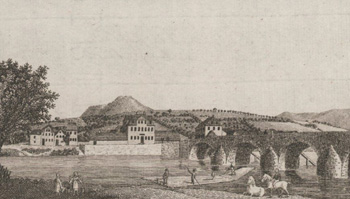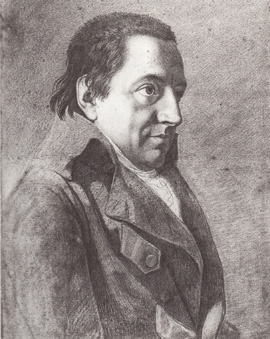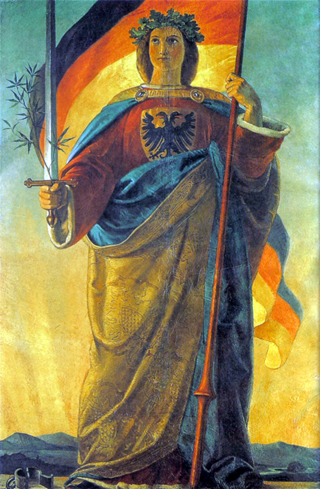
Your complimentary articles
You’ve read one of your four complimentary articles for this month.
You can read four articles free per month. To have complete access to the thousands of philosophy articles on this site, please
Brief Lives
Johann Gottlieb Fichte (1762-1814)
Matt Qvortrup on the cosmopolitan idealist who became the misunderstood father of German nationalism.
On the 19th of February 1919, The Times carried a report of a speech made the previous day by the German President, Friedrich Ebert. “We shall realise that which Fichte has given to the German nation as its task,” said the Social Democrat: “We want to establish a state of justice and truthfulness founded upon the equality of all humanity.” It is as telling as it is noteworthy that Ebert evoked the name of Johann Gottlieb Fichte (1762-1814) in his address to the Parliament of the newly established Weimar Republic. For Ebert and his contemporaries, Fichte was a cosmopolitan thinker and proponent of social justice and equality.
Fast forward almost a hundred years, and Fichte is regarded as a national chauvinist. In 2012 the German newspaper Die Zeit wrote, “The judgement of history is unequivocal. Fichte had an ominous impact on German history. All extenuating circumstances notwithstanding, he is one of the forefathers of German nationalism, and through this played a role in the rise of National Socialism.”
Was Fichte a prophet of cosmopolitanism or a precursor of ethnic nationalism? In the year of the bicentenary of Fichte’s death – he died in January 1814 of typhus contracted from his wife, who worked in a hospital for soldiers – it is worth reconsidering his thinking. Fichte’s philosophy is increasingly recognised by so-called ‘progressive’ writers (including, for example Slavoj Žižek), and his ‘cosmopolitan patriotism’ provides a corrective to the degenerated version of nationalism that some have associated with his name.
Early Life & Active Thinking
In British philosophy textbooks Fichte is mentioned (if at all) as a stepping-stone between Immanuel Kant and G.W.F. Hegel, and as someone who later in life acted as an apologist for German national pride and petty chauvinism. He was probably the former, but arguably wasn’t the latter. Throughout his career as a public intellectual, Fichte was driven by an often fanatical obsession with equality and liberty. He was a philosopher of action, who famously said, “I do not wish only to think, I wish to act.”

Jena around 1800
This attitude was partly due to his humble origins. The son of an impoverished weaver from Saxony, Fichte was ‘discovered’ by Baron von Miltitz, and was able to enter Schulpforta, an elite German school later attended by Nietzsche. Fichte went on to study theology at the University of Jena. But fate dealt him a blow when Miltitz died and his widow stopped his financial support. Unable to finish his degree, Fichte had to work as a tutor for rich aristocrats, who often – so he would have us believe – treated him with condescension and contempt.
After a period as an itinerant teacher, Fichte familiarised himself with Kant’s work. In 1791, on one of his many impulses, he travelled to visit Kant himself in Königsberg. He was cordially welcomed by the old philosopher, who seemed to take an instant liking to the young whippersnapper. To make an impression on Kant, Fichte had hastily written a study of religion based on Kant’s philosophy. Kant read the book with enthusiasm and helped secure its publication under the title An Attempt at a Critique of All Revelation (1792).
The story of how the volume was published without the name of the author on the cover, how many people thought the essay was Kant’s long-awaited treatise on religion, and how Fichte became famous overnight when he was revealed as the author, has become mythological in the history of philosophy. It is certain that the publication of the book helped Fichte’s career and improved his financial situation. He was able to marry and live a more comfortable life. Three years later, the student who had failed to get his degree at the University of Jena returned there to take up a chair as Professor of Philosophy, in a town the contemporary French lady of letters Madame de Staël called ‘the Athens of Germany’.
While at Jena Fichte wrote his famous Wissenschaftslehre (1796) – often translated as the Theory of Scientific Knowledge – as well as a series of polemical political tracts. But his outspoken views led to accusations of atheism, accusations which subsequently prompted him to resign his chair in a fit of anger. This was typical of Fichte. He was by all accounts a charismatic and a cantankerous soul, and his temper often got the better of him. Aged thirty-seven, his passion, brilliance and charisma had taken to the highest academic peaks, from which he had fallen because of his pride and argumentative nature.
Once again penniless, but now with a wife and a young son to support, Fichte went to Berlin and began to support himself and his family as a freelance writer and lecturer. It was a precarious existence, in what he called an “immense, dusty, tiring city.” But he delivered his lectures on nationalism in the Prussian capital, which in turn led to his appointment as professor of philosophy at the University of Berlin; a position he owed to the liberal educational reformer Wilhelm von Humboldt – the man who inspired John Stuart Mill’s On Liberty.
Unlike many philosophers, Fichte was a man of action, and someone who almost invariably advocated the most radical practical consequences of the insights he reached. But before his political philosophy crystallised, his thinking had to take a diversion into theoretical philosophy (what we call metaphysics).
As a professor, Fichte was duty-bound to deliver lectures on theoretical philosophy and epistemology. His theoretical philosophy merits an important footnote in the history of philosophy, not only because of his formulation of idealism, but also because it was Fichte who in his Wissenschaftslehre first introduced the triad of ‘thesis-antithesis-synthesis’ more often associated with Hegel. In that book, Fichte sought to find a more solid foundation to knowledge than Kant had provided in the Critique of Pure Reason (1781). But the book also became a turning point in his thinking, as it provided a theoretical justification for engaging in practical politics. As he summed it up in the more popular work Bestimmung des Menschen (The Vocation of Man, 1800), Fichte had reached the conclusion that our vocation “is not merely to know but to act in accordance with [our] knowledge.”
His path to this realisation was convoluted. Unlike Kant, but like Descartes, Fichte took the thinking ‘I’ as his point of departure. In Wissenschaftslehre he contrasted the I or Ich (or the thesis), with the not-I or Nicht-Ich (or antithesis). The not-I held the I in check; and this fact not only implied that a not-I existed, but also pointed beyond this opposition. The I/not-I opposition could only be resolved by introducing an I that was capable not just of speculation, but of action: the only way out of pure speculation was by accepting that the I was acting freely in the world. As Fichte pointed out in Die Bestimmung des Menschen, “you do not exist for idle self-observation or to brood over devout sensations. No, you exist for activity.” So the synthesis of the I and not-I was an acting intellect. For philosophical purists, such as Fichte’s later student Arthur Schopenhauer, this deduction of the active intellect was logically and philosophically illegitimate. Fichte was willing to concede this. Indeed, the title of the chapter in Bestimmung des Menschen in which he outlined this argument was ‘Belief’ (Glaube).
But reaching the conclusion that the human Ich is fundamentally called to act apparently liberated Fichte. It forced him to pursue his first love, political philosophy. As he wrote in a letter to his friend Karl Reinhold in 1799, once the meaning of theoretical philosophy is grasped, it can be discarded. While not entirely discarding his theoretical thinking, Fichte turned to practical philosophy, and began to write for a broader audience, and so became a public intellectual rather than an ivory-tower theorist (the fact that he was penniless also contributed to this new focus). The young man who had read Kant’s Perpetual Peace (1795) with enthusiasm, gradually began to develop his own political thinking.
Political Philosophy

Fichte by Friedrich Bury
In his earliest writings Fichte had been an outspoken critic of nationalist sentiments. Indeed, after the French conquest of the Rhineland in 1774, he even spoke of himself as “a young man who had abandoned his fatherland and did not feel bound by any state.” His aim then and later was cosmopolitan and utopian. Foreshadowing Marx’s prediction of the ‘withering of the state’, Fichte bluntly stated in Some Lectures Concerning the Scholar’s Vocation (1796) that “the state… aims at its own destruction. It is the purpose of government to make itself superfluous.” He was in no doubt, that, as he put it in his Staatslehre (Theory of the State) written a year before his untimely death, “traditional government would wither away” However, “this moment has not yet arrived.” And in any case, he had yet to spell out the process by which the withering of the state would take place.
Kant had argued that trade liberalisation – what he called ‘the spirit of commerce’ (der Handelsgeist) – would slowly but surely lead to a kind of brotherhood of man. Fichte agreed with Kant that the “whole race that inhabits our globe will… become assimilated into a single republic including all peoples” but he did not see free trade, let alone economic liberalism, as the path to perpetual peace. Rather, he feared that the economic competition between states would generate new enmities that would lead to war. Moreover, unlike his former mentor’s espousal of classic economic liberalism, Fichte made a case for economic protectionism and a planned economy in Der geschlossene Handelsstaat (The Closed Commercial State, 1800). This book’s defence of social justice facilitated by government intervention is but one of the reasons it has been labelled the first systematic case for the welfare state.
The Closed Commercial State was a philosophical Rubicon for Fichte. He maintained that all people eventually would be united into a single “peoples’ republic of culture,” and here he began to consider how this would be achieved, gradually coming to the conclusion that the German people could play a pivotal role in the process of creating a cosmopolitan utopia.
In 1804-1805, Fichte delivered a series of lectures entitled Characteristics of the Present Age (Grundzüge des Gegenwärtigen Zeitalters), in which he outlined five stages of human development. Having travelled from the primal state of noble savages in ‘the Age of Innocence’, through dark ages, absolutism, and the ‘State of Progressive Justification’, mankind was now on the threshold of ‘the state of completed justification and sanctification’. Indeed, the ideals of the French Revolution had been characteristic of the State of Progressive Justification, but to reach political nirvana it was not enough to rely on the ideals of the French, which in any case had been undermined by the conquering forces of Napoleon. So in 1807 – the year after Hegel had described seeing ‘the world spirit on horseback’ in the guise of the French emperor, and at a time when the Germans were at a historical nadir and the once all-powerful Prussia was a shadow of its former military self – Fichte proposed that the Germans had to seize the day. In fourteen addresses, delivered as entertainment for bourgeois Berliners on Sunday afternoons in the winter of 1807, Fichte asserted that the Germans had a historical role: namely that of shepherding humanity into the bliss of a cosmopolitan utopia.
To fulfil its potential, to complete its spiritual and political journey, mankind needed Kultur, which Fichte defined as “the exercise of all forces for the purpose of total liberty, of total independence from everything which is not ourselves, which is not our pure ego.” But to be cultured was not a matter of winning on the battlefield: “Victories are won not by the power of a man’s arm, nor by the effectiveness of weapons, but by the strength of mind,” he said in the Eighth Address; and in the strength of mind the Germans were the masters. (Fichte would not have been surprised to learn that Monty Python’s philosophy football-match featured Germany and Greece, nor that Thomas Mann pondered “if you can be a philosopher without being German?”) So as the inventors of critical philosophy and scientific thinking, the Germans had a unique historical role in spreading this Kultur, by “leading the way and serving as an example for the rest,” or as Fichte put it in his Third Address, critical philosophy had become a “mirror to this nation,” and propagating the ability to think freely had become the “purpose for which [the German nation] is destined.”

Germania by Philipp Veit
This was not, Fichte believed, a mere accident. Unlike most other European nations, the Germans had maintained their language free of Latin influences. This did not mean that the Germans were in any sense better than other Europeans, but because the German language had maintained its purity, German philosophers were able to express thoughts clearly and without mediation. (It is interesting to note that Fichte’s theory of a pure and undiluted language was taken up by the Arab nationalist thinker Zaki al-Arsuzi (1899-1968), the philosophical godfather of Pan-Arabism, and that – notwithstanding certain incriminating anti-Semitic remarks – Fichte inspired the early Zionists to revive the Hebrew language.)
The Germans themselves were not yet ready to take on the burden of educating humanity. True, their language enabled them to utter deep thoughts, and so potentially to spread reason to the rest of mankind. But in order to fulfil their mission, the Germans themselves needed educating. Thus educational reform, not military strength, was Fichte’s key policy proposal. And in his Second Address he went to great lengths to explain how the aim of education was to make active and creative individuals who would “learn with enjoyment and love, purely for the sake of learning itself.” The aim was to facilitate “the capacity to spontaneously construct images that are not at all replicas of reality, but are capable of becoming models for reality.”
Fichte’s political philosophy was not static. As he grew older he adopted less liberal positions. But for all this, he maintained the view that, as he put it in his Staatslehre, one day the “whole human race on earth will be encompassed in a single… state, which according to a common plan will vanquish nature and enter the higher sphere of another life.”
It is undisputed that Fichte’s writings were later abused by the likes of Otto von Bismarck, but reading Fichte himself, it is hard to find much evidence for him as an apologist of Blut und Boden (‘blood and soil’) nationalism. Indeed, it is instructive to note that Fichte wrote dismissively of ‘national hatred’ in The Closed Commercial State, and that in a lecture delivered during his brief tenure as Professor in Erlangen in 1805, he also attacked the patriotism of every other nation as “egoistic, narrow and hostile to the rest of mankind.”
Fichte’s thought was often complex, and he appreciated that not all would comprehend the poetic arguments at the heart of his philosophy. But he expressed confidence that “he who feels it within himself will be convinced.” And to those “puffed-up blowhards, half-educated men who drifted through school,” and who did not understand, he had a simple message; “give up your contempt for deep thought and scholarship, and learn what you do not know.”
© Dr Matt Qvortrup 2014
Matt Qvortrup earned his doctorate at Oxford University and currently teaches at Cranfield University. He is the author of, among other works, The Political Philosophy of Jean-Jacques Rousseau (Manchester University Press, 2003) and Referendums and Ethnic Conflict (Pennsylvania University Press, 2014).









